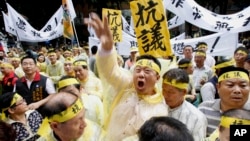MANILA —
Advocates for Philippine migrant workers say they are concerned about the effects of a hiring freeze Taiwan's government has put in place against the Philippines. The move came less than a week after a Philippine Coast Guard crew admitted shooting at a Taiwanese vessel, killing a fisherman.
Statistics from the Philippine Overseas Employment Administration show close to 30,000 Filipinos are hired as workers in Taiwan every year. The government says there are a total of more than 85,000 workers there now.
Migrante International Chairman Garry Martinez says workers with pending applications for jobs in Taiwan will be hit especially hard. This is because even before they leave, they may owe recruitment and other application fees, which come to one month’s salary or more.
“They’re asking for the bank to give them money and there is some collateral and the big interest to the loan shark. That is the problem they are facing now,” he said.
Martinez says workers already in Taiwan also face uncertainty. His niece is a machinist at a factory and he says he has received reports from her and from other factory workers that their bosses anticipate business will slow down if they cannot hire.
The hiring freeze and sanctions on travel to the Philippines went into effect Wednesday, after Taiwan rejected Philippine President Benigno Aquino’s apology for the fishing incident, calling it unofficial because it came from a de facto envoy to Taiwan. Taiwanese investigators in Manila on Saturday called the shooting a murder.
Aquino’s spokespeople have reiterated the administration’s regret over the “unintended and unfortunate incident,” drawing the ire of Taiwan President Ma Ying-jeou, who said they could not assess the situation in these terms without a joint investigation. But the Philippines has said "no" to such an arrangement.
Manila-based security analyst Rommel Banlaoi says the carefully worded messages are in keeping with the Philippines’ view that Taiwan is part of China.
“We deal with Taiwan [in a] purely economic sense, trade and commerce and investment. But we avoid having political or security ties with Taiwan… because we don’t want to undermine the ‘One China’ policy,” said Banlaoi.
Banlaoi says Taiwan’s reaction is “not an act of a friend,” especially because they are the sixth-largest partner of the Philippines with annual trade of $2 billion. He says the overseas contract workers are a major contributor to this relationship.
Statistics from the Philippine Overseas Employment Administration show close to 30,000 Filipinos are hired as workers in Taiwan every year. The government says there are a total of more than 85,000 workers there now.
Migrante International Chairman Garry Martinez says workers with pending applications for jobs in Taiwan will be hit especially hard. This is because even before they leave, they may owe recruitment and other application fees, which come to one month’s salary or more.
“They’re asking for the bank to give them money and there is some collateral and the big interest to the loan shark. That is the problem they are facing now,” he said.
Martinez says workers already in Taiwan also face uncertainty. His niece is a machinist at a factory and he says he has received reports from her and from other factory workers that their bosses anticipate business will slow down if they cannot hire.
The hiring freeze and sanctions on travel to the Philippines went into effect Wednesday, after Taiwan rejected Philippine President Benigno Aquino’s apology for the fishing incident, calling it unofficial because it came from a de facto envoy to Taiwan. Taiwanese investigators in Manila on Saturday called the shooting a murder.
Aquino’s spokespeople have reiterated the administration’s regret over the “unintended and unfortunate incident,” drawing the ire of Taiwan President Ma Ying-jeou, who said they could not assess the situation in these terms without a joint investigation. But the Philippines has said "no" to such an arrangement.
Manila-based security analyst Rommel Banlaoi says the carefully worded messages are in keeping with the Philippines’ view that Taiwan is part of China.
“We deal with Taiwan [in a] purely economic sense, trade and commerce and investment. But we avoid having political or security ties with Taiwan… because we don’t want to undermine the ‘One China’ policy,” said Banlaoi.
Banlaoi says Taiwan’s reaction is “not an act of a friend,” especially because they are the sixth-largest partner of the Philippines with annual trade of $2 billion. He says the overseas contract workers are a major contributor to this relationship.




